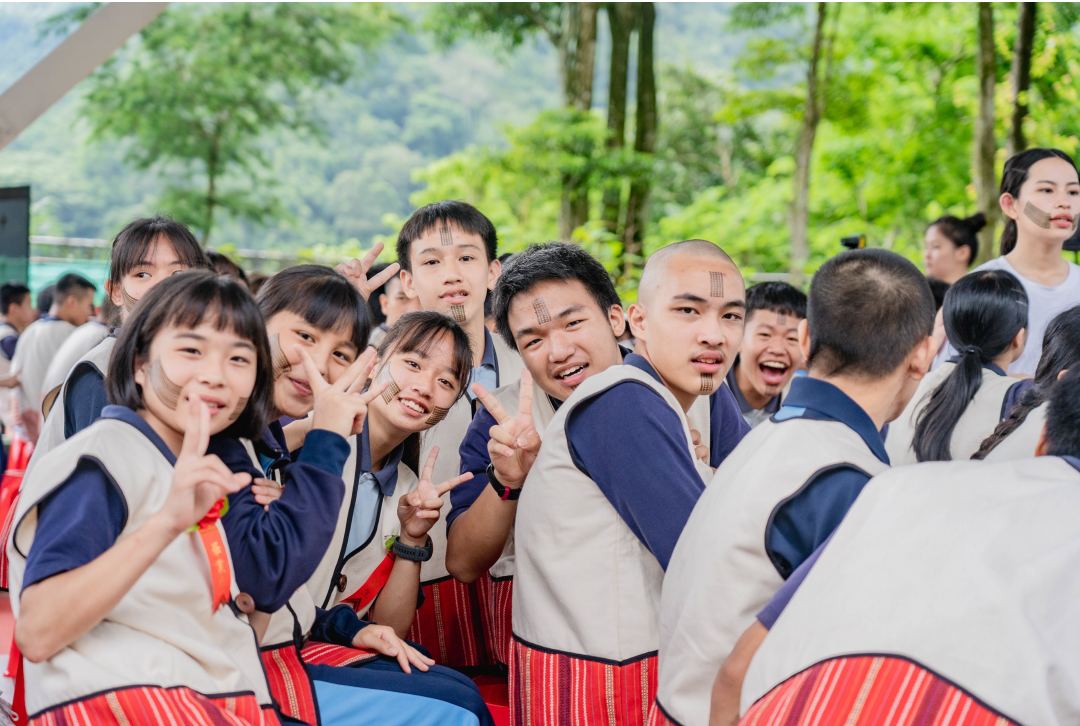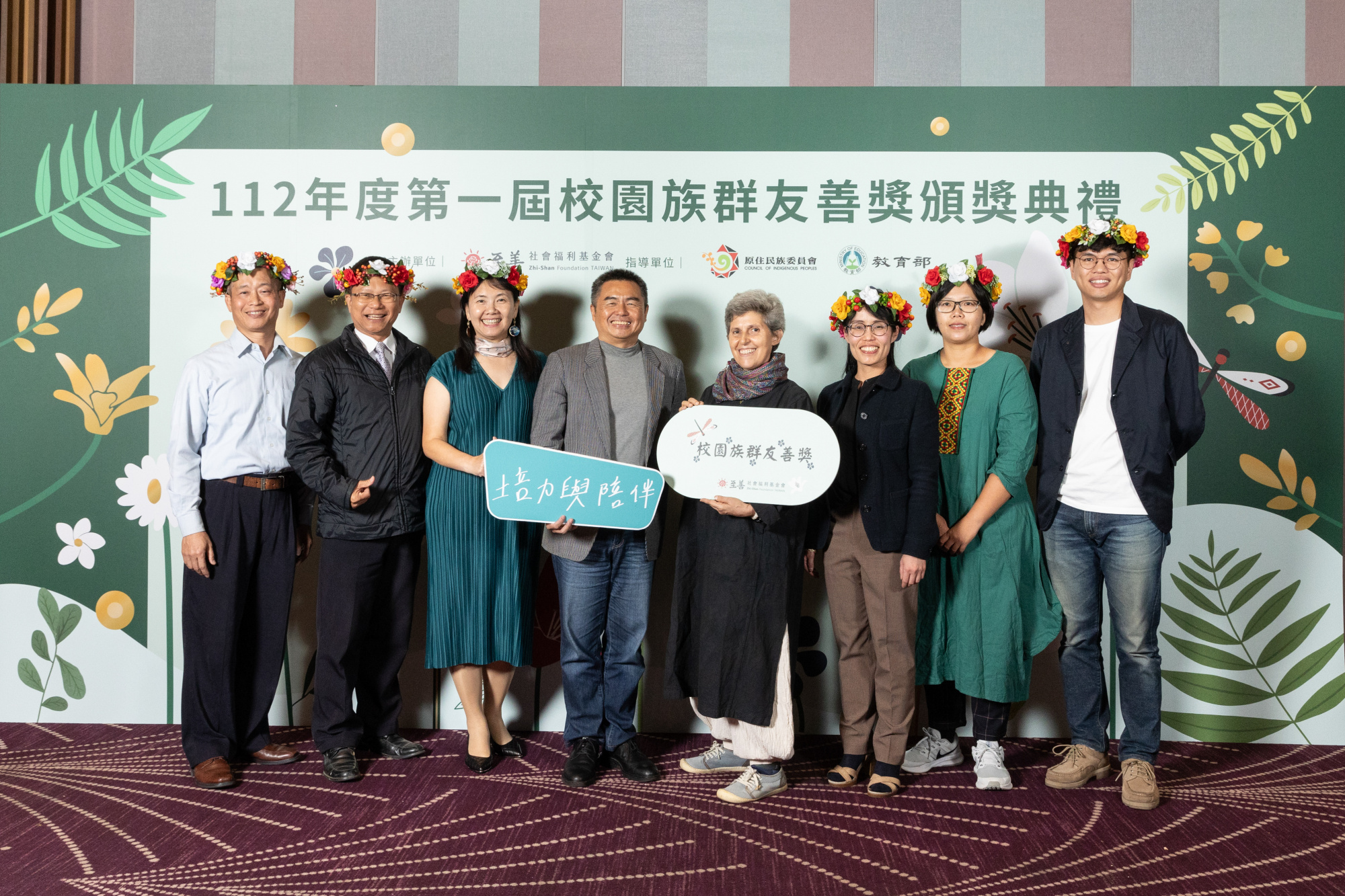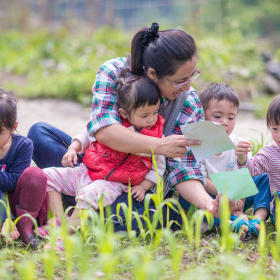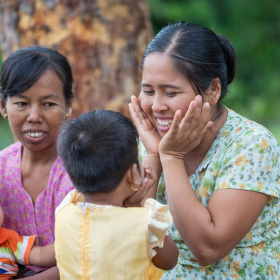Campus Community Friendliness Initiative

- Background
Zhi-Shan Foundation has long been dedicated to promoting the development of indigenous children and youth in Taiwan. Through our service experience, we often find that indigenous children and youth still face various forms of personal, organizational, and institutional discrimination on campuses from elementary school to university. These forms of discrimination or subtle biases often lead many indigenous children and youth to lose interest in education and their sense of ethnic identity.
In response to the principle of non-discrimination in the Convention on the Rights of the Child (CRC), Zhi-Shan began promoting the "Campus Community Friendliness" initiative in 2023. This initiative includes the design of activities such as the "Campus Community Friendliness Award," "Lectures and Seminars on Discrimination," and the development and promotion of "Games (Board Games) Regarding Campus Discrimination."
Respecting multiculturalism is an important value in modern democratic societies. Zhi-Shan hopes that through the promotion of the Campus Community Friendliness initiative, true respect and acceptance can be realized within the existing campus framework, allowing different cultures to become shared assets and ensuring that children from different ethnic groups receive genuine support.
- Actions to follow up
- Education. Zhi-Shan began collaborating with "Schools in Play" to develop the first set of board games on discrimination issues, titled "Our Island." We invite primary and secondary school teachers to integrate the board game with the human rights literacy curriculum outlined in the Grade 7-12 Curriculum Guidelines. Through gaming, students are provided with opportunities for practical participation, experience, and learning. This fosters awareness of their daily stereotypes and biases, guides them to explore different cultural groups, instills the concept of ethnic friendliness, and cultivates cooperation, understanding, and respect to facilitate cross-cultural communication.
- Teacher Training. Training educators to develop a mindset of ethnic friendliness is crucial for establishing a friendly campus environment. Zhi-Shan conducts 30-50 sessions of board game training workshops, providing primary and secondary school educators with professional knowledge and skills related to ethnic friendliness education. This includes techniques for using the "Our Island" board game, promoting multicultural understanding in the classroom, and handling and preventing discriminatory behavior
- Experience and Resource Sharing. To share experiences and resources, we establish a professional team of lecturers, forming a platform that combines experience sharing, resource sharing, and mutual support. This platform not only offers updated knowledge but also shares successful practices and resources, nurturing more seed teachers to lead ethnic friendliness practices on campuses. Additionally, we will actively manage the "Understanding My Perspective" Facebook page, expanding the influence of ethnic friendliness principles through sharing relevant knowledge, case stories, and advocacy activities, encouraging more people to participate in this movement.
- Advocacy for Policy Change. Zhi-Shan actively participates in the formulation and amendment of government policies, advocating for more support and resource allocation from government departments (such as the National Human Rights Commission, Ministry of Education, Ministry of Health and Welfare, Ministry of Culture, and Council of Indigenous Peoples) to promote education on ethnic harmony, ensuring comprehensive promotion of related values.
- Media Promotion. Zhi-Shan utilizes various media platforms to promote successful cases and educational information, guiding society's attention and support towards ethnic harmony.
- Continuous Monitoring and Evaluation. Monitoring and evaluation are indispensable for the success of the project. We continuously collaborate with teachers from various universities, participate in research projects, organize forums or seminars, establish a scientific evaluation system, collect and analyze relevant data, and ensure the effectiveness and results of the project based on evidence, thus guaranteeing the effectiveness of the project's promotion.
- Stories of Past Campus Community Friendliness Award Winners
First Edition

- Group Award
- Kaohsiung City Municipal Padan Tribe Junior and Elementary School
Located in the Hakka settlement, Kaohsiung City Municipal Padan Tribe Junior and Elementary School boasts a diverse population including the Bunun, Paiwan, Rukai, Hakka, and Han Chinese ethnicities. The school designs its curriculum considering the needs, characteristics, and cultures of each ethnic group. They have a rigorous screening mechanism for teacher recruitment, giving priority to teachers with multicultural competence, particularly those with indigenous backgrounds, who must commit to long-term (at least five years) engagement with the campus.
- Kaohsiung City Municipal Padan Tribe Junior and Elementary School
Promoting an experimental school in a diverse ethnic area poses certain challenges. The principal and teachers have dedicated significant effort to communicate with parents and the community. During each semester's opening ceremony, the school opens its doors to invite parents and community members to observe classes. The school clearly introduces its philosophy and educational policies, ensuring alignment and acceptance from parents and the community.
In terms of curriculum design, they deconstruct and reconstruct the Grade 1-9 curriculum into the "Four Seasons, Four Learning Abilities" curriculum. For example, during the Bunun tribe's millet growth festival season, they organize themed activities such as Spring Learning Planting Season, Summer Learning Ear Shooting Festival, Autumn Learning Warehouse Festival, and Winter Learning Year-end Festival. These activities integrate various themes including historical exploration, ecological discovery, dietary rhythm, reading topics, image recording, totem art, songs and musical instruments, Bunun culture, native languages, Mandarin, mathematics, and English.
Creating a friendly atmosphere on campus is crucial for students. Kaohsiung City Municipal Padan Tribe Junior and Elementary School provides extensive support to students, nurturing their confidence and expressive abilities, equipping them with the energy and skills to face mainstream societal systems.
Due to the early migration of many Amis people from the tribes to Badouzi, the school has a student population consisting of 30% Amis and 70% Han Chinese. In 2019, Badou Senior High School transformed its "Indigenous Arts Class" into the "Indigenous Experimental Education Class." The school has established close connections with the community, shared resources, jointly prepared indigenous curriculum, and created an immersive environment for indigenous language teaching, allowing students to learn traditional culture and skills from tribal members. Additionally, the school employs off-campus teaching methods, enabling students to learn cultural content, knowledge, and skills, such as constructing traditional Amis buildings on campus and conducting field trips to students' native tribes.
The traditional Amis buildings on campus serve as gathering places for children, where they can cook, chat, and share their feelings or daily lives. These buildings are highly utilized, fostering a strong ethnic cultural atmosphere on campus and emphasizing the importance of cultural diversity, promoting a better understanding and respect for indigenous culture among non-indigenous students.
Furthermore, the school provides young teachers of indigenous descent with significant flexibility and administrative support. The curriculum includes indigenous culture (urban indigenous), community practice (visiting settlements), and research projects (thinking and problem-solving), conducted in a "teacher-student co-learning" mode. The school also emphasizes the professionalism of its teaching staff by establishing a teaching guidance community for faculty and organizing regular workshops on "Keelung City Indigenous Historical Justice and Transitional Justice," where teachers collaboratively prepare lessons, exchange ideas, and learn from each other, thereby enhancing their professionalism.
- National Fengshan Senior High School (Kaohsiung)
National Fengshan Senior High School is a typical urban school with a relatively low proportion of indigenous students. However, the school actively invests efforts in indigenous students, understanding the difficulties and pressures they face. It proactively applies for funding from the Ministry of Education and the Council of Indigenous Peoples to establish an Indigenous Youth Research Club, rallying indigenous students together and inviting non-indigenous students to participate. The club aims to collectively discuss the racial discrimination and stereotypes encountered on campus and brainstorm strategies to address them. This initiative aims to increase indigenous students' confidence and awareness of their ethnicity, helping them to voice their concerns within the mainstream system and advocate for equal dialogue opportunities. It also promotes mutual understanding between teachers and students on campus, fostering an understanding of the challenges within the indigenous context.
The Indigenous Youth Research Club is not just a support group but also an active agent for positive change on campus. Participation is not limited to indigenous students; friends of indigenous students or interested peers also join activities such as field trips to tribes and craft classes. This exchange fosters mutual understanding of the challenges within each other's growth context, creating a warm connection that truly embodies the concept of ethnic friendliness on campus.
- Individual Award
- Enos Peng, principal of Municipal Jianshiguomin Junior High School
Principal Peng, a Hakka and a Christian, possesses a warm, humble, and highly inclusive personality. He is happy to learn about indigenous cultures and connect and share resources, demonstrating exceptional cultural sensitivity. Since most of the children at Jianshiguomin Junior High School come from the mountainous areas of Jian-shi Township, Peng takes the initiative to visit the farthest mountain tribes himself, spending 2-3 hours driving for home visits to better understand the children's living conditions. On campus, he not only knows every child's name but also which tribe they come from.
Principal Peng has long been involved with members of the Tnunan Alliance in advocating for and investing in indigenous culture, experimental education, and indigenous education. He integrates traditional culture into the curriculum and invites elders to share their knowledge by adding a touch of humor, making learning more than just about dull textbooks. Many traditional buildings on campus are jointly constructed by tribal elders and students, allowing students to experience the vitality of their culture up close! Additionally, principal Peng actively communicates and coordinates with educational institutions, communities, and parents to assist and ease the understanding of indigenous education, hoping to establish a coherent experimental education system for students from elementary to high school levels in the future.
- National Hualien Girls' High School Teacher Hong-Wei Ji
Affectionately known as "Mother Ji" by the girls of Hualien Girls' High School, Hong-wei Ji has been teaching at the school for many years and holds a deep understanding of the struggles and needs of indigenous students within a school where academic achievement is prioritized. Thus, from sporadic "dates" with the girls to leading them in establishing the "UwaKaying" (named after the girls in the Taroko and Amis languages) club, the girls plan various courses, camps, and even seminars themselves. They naturally immerse themselves back into their own culture, express their feelings truthfully, and showcase their elegance. This not only enhances everyone's understanding of indigenous culture but also fosters a strong sense of ethnic identity.
Apart from actively caring for indigenous students, Ji serves as a bridge of communication between the school, faculty, and indigenous students. She assists teachers in developing courses and activities related to indigenous peoples, such as arranging school-wide campus lectures on a regular basis to cultivate the entire school's understanding of indigenous culture. Additionally, organizing indigenous heritage days allows girls from different ethnic groups to proudly wear their traditional costumes to school, showcasing their culture and allowing non-indigenous students to appreciate the diverse faces of different ethnic groups.
- Jin-Shan High School Teacher Hsiao-hui Huang
At Jin-Shan High School, students affectionately call Hsiao-hui Huang, "Sister Meow." Indeed, she's like a big sister, looking out for every child in need at the school.
With over twenty years of dedication to Indigenous education, Sister Meow frequently connects with experts and alumni to give school-wide and classroom lectures on Indigenous topics. She strives to create a more welcoming learning environment for both Indigenous and non-Indigenous students, fostering understanding of Indigenous experiences throughout the school. Additionally, Sister Meow carefully discusses and plans the content of Indigenous class exhibitions with her students, sharing insights on social media. This not only promotes Indigenous culture but also records the journey of student growth, affirming their efforts.
Furthermore, Sister Meow creates a supportive space for students facing misunderstandings from mainstream society. Through discussions about students' encounters with stereotypes or discrimination, she listens and fosters cultural sensitivity and critical thinking, guiding students in learning and practicing responses to such situations, ensuring they know they are not alone and have support.
- Mingdao High School Teacher Ming-heng Tsai
In schools where academic pursuits often overshadow civic education, Ming-heng Tsai stands out with his innovative approach. Through a series of thematic exhibitions, students embark on a journey of exploration, from interviews and data collection to showcasing their findings. They delve deep into historical contexts, reflecting on past events and fostering reconciliation while challenging stereotypes and discrimination against Indigenous peoples. This approach goes beyond imparting knowledge; it cultivates respect, understanding, and a broader perspective on cultural diversity.
Tsai prioritizes a human rights perspective, expanding students' awareness of Indigenous issues through curriculum design and guest lectures. By integrating Indigenous topics into social science courses, students gain insight into Indigenous culture, political violence, transitional justice, and the history of Indigenous peoples. Through thoughtful consideration of how to promote Indigenous perspectives without causing offense, Mr. Tsai ensures that students engage meaningfully with Indigenous issues, fostering a deeper understanding of Indigenous culture and history.




